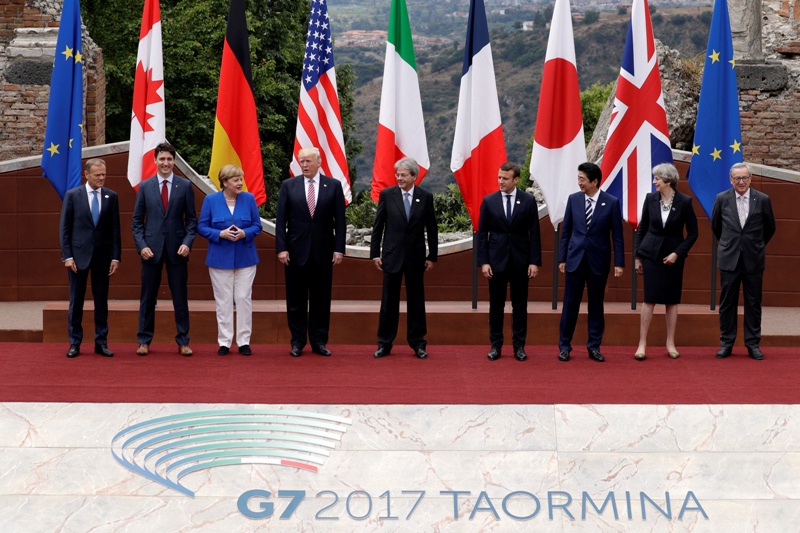Unlike ASEAN, G7 leaders send strong statement on South China Sea

In this May 26, 2017, photo, leaders of the G7, from left, European Council President Donald Tusk, Canadian Prime Minister Justin Trudeau, German Chancellor Angela Merkel, U.S. President Donald J. Trump, Italian Prime Minister Paolo Gentiloni, French President Emmanuel Macron, Japan's Prime Minister Shinzo Abe, British Prime Minister Theresa May and European Commission President Jean-Claude Juncker pose during a group photo for the G7 summit in the Ancient Theatre of Taormina ( 3rd century BC) in the Sicilian citadel of Taormina, Italy. As he dashed through the Middle East and Europe, Trump looked like a conventional American leader abroad. He solemnly laid a wreath at a Holocaust memorial in Jerusalem, had an audience with the pope at the Vatican and stood center stage with Western allies at the annual summits that dominate the diplomatic calendar. But when Trump spoke, he sounded like anything but a typical U.S. president. AP/Andrew Medichini
MANILA, Philippines — Contrary to their Southeast Asian counterparts, the leaders of the Group of Seven advanced economies reaffirmed their commitment to maintaining a rules-based order in the East and South China Seas.
The G7—composed of Canada, France, Germany, Italy, Japan, the United Kingdom and the United States—urged all parties to pursue demilitarization of disputed features in the region.
"We reaffirm our commitment to maintaining a rules-based order in the maritime domain based on the principles of international law, including as reflected in the United Nations Convention on the Law of the Sea (UNCLOS), and to the peaceful settlement of maritime disputes through diplomatic and legal means, including arbitration," the G7 leaders said in a joint communique following their meeting in Taormina, Italy last Saturday.
The leaders were also strongly opposed to any unilateral actions that could increase tensions in the region.
This statement from the G7 leaders appears to be stronger than the Chairman's Statement of the Association of Southeast Asian Nations issued on April 29.
READ: Philippines goes easy on China in final ASEAN statement
Despite having four member states directly involved in the maritime dispute, the ASEAN under the leadership of President Rodrigo Duterte did not mention the militarization of the South China Sea in its final statement after a Leaders' Summit in Manila last month.
"We took note of concerns expressed by some Leaders over recent developments in the area. We reaffirmed the importance of the need to enhance mutual trust and confidence, exercising self-restraint in the conduct of activities, and avoiding actions that may further complicate the situation, and pursuing the peaceful resolution of disputes, without resorting to the threat or use of force," the ASEAN chairman's statement read.
The 10-member regional bloc, however, reaffirmed the importance of maintaining peace, stability, security and freedom of navigation and overflight in and above the South China Sea.
The ASEAN also failed to mention the landmark ruling of an international tribunal which invalidated China's nine-dash line claim over the South China Sea.
China's expansive claim in the disputed waters overlaps with the exclusive economic zones of Brunei, Malaysia, the Philippines and Vietnam, which are all members of the ASEAN.
Meanwhile, Beijing has expressed dissatisfaction with the mention of the East and South China Seas in the G7 statement.
"China is committed to properly resolving disputes with all nations involved through negotiations while maintaining peace and stability in the East China Sea and South China Sea," Chinese Foreign Ministry spokesperson Lu Kang said in a statement.
China has a dispute with Japan, a G7 member, over a group of uninhabited islets in the East China Sea.
Lu referred to the statement as "irresponsible remarks" and called on the G7 and other nations to "refrain from taking positions."
RELATED: Challenging China, US launches first South China Sea operation under Trump
- Latest
- Trending





























